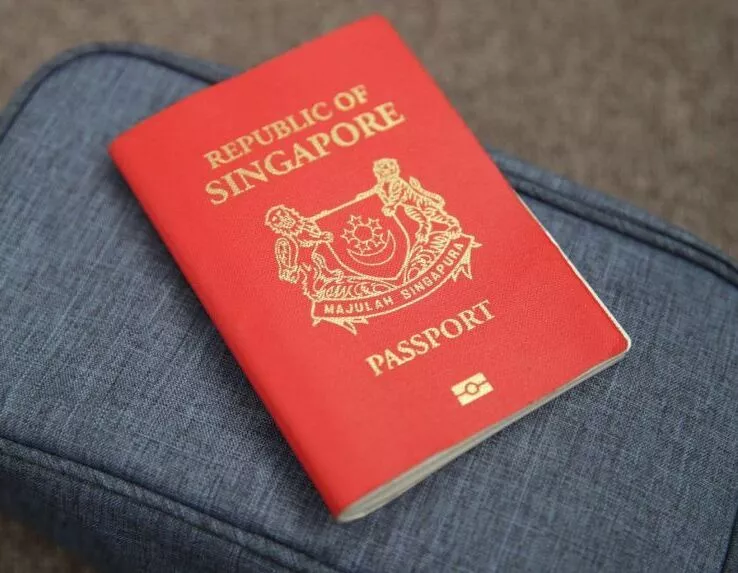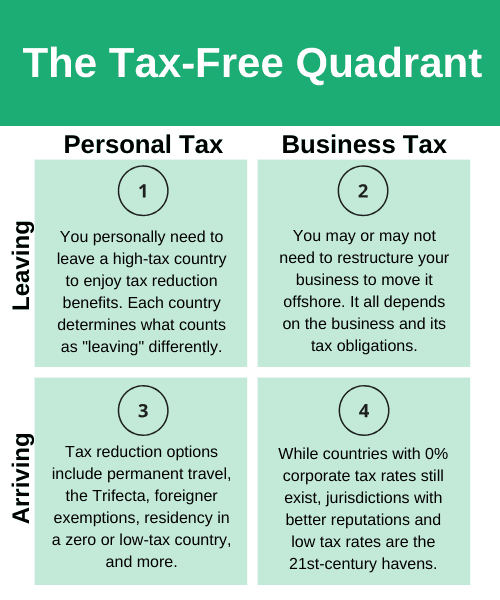How to Legally
Lower Your Taxes
Take yourself and your business offshore and reap the
benefits of legally reducing your taxes.
Imagine for a minute that you’re looking to buy a car
for $28,000.
You’re most likely going to read dozens of online
reviews, compare prices at various dealerships nearby,
and possibly time your purchase just right so you can
get the biggest discount.
All that trouble for a savings of maybe $4,000, if
you’re lucky.
Now, think about your tax bill. If your annual taxable
income is $500,000 and you live in a western country,
you’re easily paying $200,000 a year in taxes.
Why not look into lowering that expense?
Let me put that into perspective. In 20 years, you will
shell out $4 million in tax.
The truth of the matter is that the majority of people
put more effort into checking out the reviews of the
sushi restaurant they were thinking of going to on
Friday night than looking into how to reduce the tax
burden.
Imagine what sort of reviews the IRS would get… And I’m
not just talking about personal tax here. It’s exactly
the same for your business too.
People rack their brains to know how to grow their
businesses, attract more clients, reduce their spending,
and boost their profits. And yet, they somehow fail to
factor in their largest expense: taxes.
Perhaps you simply consider all those taxes as sunk
costs. And if you cannot see beyond the country walls
that currently confine your business, I guess that’s
true.
But the world has changed dramatically, and it’s time
your thinking changes as well. It’s time to think
globally.
Because your businesses can operate in the cloud where
borders do not exist, you can “go where you’re treated
best,” take yourself and your business offshore, and
reap the benefits of legally reducing your taxes.
Caribbean countries, amongst other countries, have
attractive Caribbean citizenship by investment programs
to compete over you.
You stand everything to gain, so here’s how it works.

How to Pay Less Taxes
CHOOSE YOUR BUSINESS TAX RATE
Moving your business abroad by setting up an
offshore company is not easy, but it certainly
can be done. Depending on your type of business,
you could potentially pay 0% tax.
CHOOSE YOUR PERSONAL TAX RATE
Move your ‘center of life’ abroad, and you could
potentially pay no tax at all. Explore some of
the best second residence countries first.
GET AN OFFSHORE TAX ADVISOR
You’ll need advice. International tax law isn’t
something you want to get wrong. You’d be
risking considerable fines or even jail time.
We’re here to help.

Countries Are Competing for Your Business
The greatest advantage governments have is that
they’ve brainwashed people to believe that there is
nothing better.
Nowhere is this more obvious than in the United
States.
People spend their entire lives thinking that the
USA is the best place on earth to live, educate
their children, go shopping, do business, and
invest.
They would never believe that they could get ahead
anywhere else.
But things have changed: location-independent
businesses are thriving with consulting empires
being built over the phone and Amazon FBA sellers
sourcing and selling products on a global scale.
You can basically make money anywhere in the world
if there is an internet connection.
So, let’s flip this thing on its head. Instead of
believing that one country has a monopoly on the
perfect lifestyle and business environment, realize
that there are countries out there competing for
your business.
Let that sink in.
Dozens of countries with no income tax across the
globe want successful people like you, and they’re
willing to offer liberal tax deductions, fewer
regulations, more efficient systems, and many other
benefits.
If you’re looking to lower your tax burden, you’ve
got options.
It’s time to shop around.
Countries – especially the ones that are looking for
immediate access to capital to sustain or accelerate
their growth –are seeking successful business
owners, investors, and high-net-worth individuals to
move to their country.
On the other hand, a US citizen will open a Health
Savings Account, track their medical expenses while
keeping each receipt to may or not be eligible for a
minor tax exemption of their adjusted gross income.
They will take a small slice of your profits, and we
do mean small, but largely, they have set up their
tax regimes to be beneficial to you.
US citizens don’t have to be stuck in the loop of
federal income taxes and The Earned Income Tax
Credit.
UK citizens can’t count on their tax code, which is
constantly changing.
It all comes down to one question: Do you trust your
country’s tax system?
Do you believe that your federal income tax bill is
going up? Can you count on a tax break?
Do you believe that investments in retirement
accounts are the best ones?
Sometimes it’s worth paying to get out of a bad
marriage. And sometimes it’s worth keeping.
Although, sometimes, it’s worth just making some
tweaks to it.
Nothing excites me more than helping businesses to
legally lower their tax bills by setting them up
with well-thought-out tax planning strategies so
they can go where they’re treated best.
My team and I can help you through the whole
process, from shopping around to find that ideal
place to creating your holistic strategy so that you
can legally reduce your personal and business taxes.

CHOOSE YOUR TAX RATE
If you’re reading this from a
high-tax-rate country, I’m sorry to say,
that you’ve chosen to pay that high tax
rate.
By choosing to stay put, you are sending
your own money down the drain and
straight into the pockets of the
taxman.
Your government has been successful because they’ve convinced you that you need to hand a considerable percentage of your income over to them on a regular basis.
You cannot go anywhere else. Your business will crumble without them. You owe it to them. The rest of the world is dangerous. You’re safer at home. It doesn’t get better than this.
That’s what they have you thinking.
Your government has been successful because they’ve convinced you that you need to hand a considerable percentage of your income over to them on a regular basis.
You cannot go anywhere else. Your business will crumble without them. You owe it to them. The rest of the world is dangerous. You’re safer at home. It doesn’t get better than this.
That’s what they have you thinking.
But that’s simply not true. You can
choose your tax rate. For some, this
will be 0% – living a tax-free life to
the fullest. Others will choose to pay a
low percentage as a trade-off for other
benefits.
For instance, you may forego paying 0% in Belize and choose instead to pay taxes in a country like Italy or Portugal through the Italy Golden visa or Portugal golden visa, where your total tax bill will be substantially lower than what you pay now.
For instance, you may forego paying 0% in Belize and choose instead to pay taxes in a country like Italy or Portugal through the Italy Golden visa or Portugal golden visa, where your total tax bill will be substantially lower than what you pay now.
You’ll lower your taxes but not
eliminate them, but you’ll be living in
Italy instead of Belize. Do you see the
trade-off? There are plenty of
jurisdictions offering either one of
these options – zero or low tax. We’ve
served more than 1,000 high-net-worth
individuals to optimize their personal
and corporate tax rates. Yes, it’s more
complicated than you think, but that’s
where we step in. Our team sits down
with government officials and pinpoint
loopholes that we can leverage. We care
more about getting the job done right
than signing off a client and moving on
to the other. That’s how we work. We get
clients that ended up paying double
their tax bill because they went to a
country that blacklists the country
they’ve chosen to set up their offshore
country. There are endless scenarios
that can go wrong, but you don’t need to
learn this firsthand. We’ll be happy to
serve you. That being said, there are
many countries that offer generous tax
exemptions and other similar incentives
to motivate people to move there. By
deciding to go where you’re treated
best, you can choose your tax rate and
take control of your life. It’s up to
you.
OFFSHORE TAX AVOIDANCE STRATEGIES THAT WILL NOT
LOWER YOUR TAXES
Now, there is an important difference between
choosing your tax rate and skirting the taxman.
One is legal; the other is not.
So, before we discuss the techniques you can
employ to lower your tax burden, let me dispel
two pervasive myths about lowering your tax
rate.
First, there are many people who believe that
they can pull off the exact same strategies used
by Google, Starbucks, and Amazon to lower their
taxes.
But your business is probably not a
multinational company with a hundred thousand
employees and offices spread all over the world.
That’s just not your reality.
Your business neither needs nor can it execute
such a highly complex tax plan.
Google’s tax plan will not work for you. You
need something specific to your business and
your personal situation.
The way you do things must be, as they say in
Southeast Asia, “Same same but different.”
Don’t copy someone else’s plan because it works
for them. That could land you in hot water.
Instead, make a plan based on the same
principles that are tailored to you. Think
things through and then create solid systems
with the help of professionals.
Second, many think that if they open an offshore
bank account, they’re automatically exempt from
paying taxes on the money in that account.
And, once again, that couldn’t be further from
the truth.
An offshore bank account will certainly protect
your money, hold foreign currency, and even
garner higher interest rates.
But it won’t lower your taxes.
Just because the money is overseas doesn’t mean
it won’t be taxed at home.
Ultimately, the jurisdiction where the money is
earned is what matters. And if you’re a US
citizen, all that matters is that the money
belongs to you.
An offshore bank account won’t lower your taxes.
So, let’s look at what will…

Personal and Business Taxes: How to Pay
Fewer Taxes
I’m the goody-two-shoes of the offshore
industry. I’ve earned that reputation
because I insist on doing things
legally. Anything less than 100% legal
is unacceptable.
The same should be true for you. If you
want real freedom – not just lower taxes
– then you need to do things properly
without cutting corners.
But when you don’t know what you’re
doing, it can be easy to slip up here
and cut a corner there without even
knowing until you’re slapped with an
exorbitant fine or even faced with jail
time.
Creating an international tax strategy
is complicated.
That is why I have created the tax-free
quadrant to simplify the bigger picture
and illustrate the different elements
you must address to ensure that you can
legally lower your taxes.
3. YOUR PERSONAL TAX IN THE PLACE YOU’RE
ARRIVING
We’re getting to the exciting bit – choosing a
new country (or countries) to live in. There are
two ways you can go about selecting a new
jurisdiction for personal tax reasons:
CHOOSE A ZERO OR LOW TAX COUNTRY AND OBTAIN TAX
RESIDENCY
When it comes to choosing a no or low-tax country,
don’t feel trapped into thinking that you must move
to one of the countries with no income tax, like the
United Arab Emirates or Seychelles – two of the many
traditional offshore havens.
It’s true that you should choose a country that has
smaller taxes, but don’t cloud your thinking by
settling for a 0% tax rate only.
Sure, there are jurisdictions such as the British
Virgin Islands, the Cayman Islands, the UAE, or the
Seychelles where you could pay no tax, but these
aren’t very desirable places to live.
Why not make a trade: and pay a low percentage of
the tax for a better quality of life? As I mentioned
before, there are quite a few benefits to paying a
little tax.
For one, you’ll be able to tell the tax authorities
where your home base is so that no other
jurisdiction tries to get you to pay their tax.
Infinity Trade Ventures clients commonly move to a
territorial tax country such as Thailand, Costa
Rica, Georgia, or Singapore, among others.
You can live there for as long as you want and if
your income is foreign-sourced, you won’t have to
pay local tax at all.
And don’t forget about countries that offer all
sorts of simplified tax regimes, flat tax rates, or
foreigner exemptions. For example, Italy will take
you in if you pay them 100,000 euros in tax. That’s
all they require.
Depending on your income, that could be a great
deal. Say you make 10 million dollars a year, which
would make Italy’s tax bill less than 1%. It’s
worthwhile checking for other such tax arrangements.
LIVE THE LIFE OF A PERPETUAL TRAVELER
Your other option to reduce your taxes in quadrant
three is to live the life of a perpetual traveler if
that appeals to you.
As a perpetual traveler, you would go to multiple
places every year and only spend a limited time in
each location so as not to trigger tax residency
requirements.
You can travel as much as you like, but if you’re
like me and benefit from having a base, consider my
Trifecta Method.
From a lifestyle point of view, I personally like
Montenegro in the summer, London in the Fall, and
Malaysia in between.
You could pick and choose your own countries or just
go traveling around the world while working and
making money at the same time.
Just know that if you spend six months or more in
any single country, they will likely try to tax you.
OBTAINING TAX RESIDENCY STATUS
For both scenarios, it’s very important to obtain
the status of tax resident in a tax-friendly
country.
Even if you’re a perpetual traveler or you’re
leaving your home country, the tax authorities will
want to know exactly where your new tax home is
located.
If you’re able to spend 90 days in one place, rent a
place, get a driver’s license, obtain a residence
permit there, and more, it will be helpful to
solidify your tax residence case.
Establish new connections and shut down old ones
when you move from your home country to a new
jurisdiction. Make it look like it’s your home.
You won’t need to live there full-time, but you’ll
need to ensure that the time you spend in your
original ‘home’ doesn’t exceed the time in your new
one.
For example, if you’re spending four months in your
home country and two weeks at a time in 16 other
countries per year, your tax residency case isn’t
that strong.
4. YOUR BUSINESS TAX IN THE PLACE YOU’RE
ARRIVING
You’d think that moving your business to a zero
or low-tax jurisdiction would be
straightforward. But, of course, countries like
the ‘fun’ of making things quite complicated.
For example, you can’t move to Portugal to take
advantage of their non-habitual tax residence
(i.e., zero personal tax rate) and have an
offshore company there. They simply don’t allow
offshore companies to be registered under your
name.
And then there are the curveballs, such as the
US being a legitimate offshore haven for some
people and certainly not for others.
Wherever you choose, make sure that you move
your company to a low-tax country and spend as
little time in your home country as possible.
You don’t want to give the tax authorities a
reason to think you might be a ‘double agent’.
Move overseas, hire employees, or open offices
to have an easier time reducing your taxes.
And just a quick word on tax havens – they are
dead as we know them. Belize might be a 0% tax
country, but it’s not reputable nor desirable to
live there. Neither is Seychelles.
You must think about 21st-century tax havens,
the ones of the modern era. For example, Malta
could qualify with its 5% tax because it gives
you so many options as to where you can bank,
visit and live – the entire EU.

YOUR PERSONAL TAX IN THE PLACE YOU’RE
LEAVING
Have you always dreamed of moving your
business to the British Virgin Islands –
a long-standing offshore tax haven –and
saving on tax while you continue to live
in the US? Not going to happen. That’s
not how offshore business works. If
you’re personally a tax resident in a
high-tax country (e.g., the US,
Australia, Canada, the UK, or New
Zealand), then your corporation will
also be a tax resident there. It won’t
matter if you’ve incorporated offshore.
In fact, all that an offshore company
will give you is more paperwork. If
you’re a US citizen, your company will
be considered a Controlled Foreign
Corporation, and since you are
personally based in the US, your company
will have a permanent establishment
there and will qualify as being engaged
in a US trade or business.
All of these provisions, among others,
will result in a mountain of reporting
requirements for your offshore company…
that will ultimately be taxed in the US
anyway with very few tax savings, if
any. You personally need to leave a
high-tax country to enjoy tax reduction
benefits. There are countries that do
not have these provisions. Most western
countries do, but there are countries
that are more lenient and want your
business, and so they will not subject
you to such strict provisions. But if
you’re in the US, the UK, Australia, or
Canada, you cannot set your company up
offshore and then live at home. You need
to leave. That doesn’t mean you can’t go
back to visit. It doesn’t mean you need
to renounce. And if you decide that you
don’t like living abroad, you can always
go back and pay taxes again.
But it’s not that difficult these days
to find new locations you’d be happy to
call home. There are plenty of
incredible places to live and run a
business around the world. You must be
sure, however, that you have
successfully exited the tax system of
your home country. If you think that
this merely means living in your home
country for 182 days or less per year,
then think again. It’s far more
sophisticated than that. If you’re
looking to leave a country, spending
less than half a year, there is not
enough to count as ‘leaving.’ Recently,
countries have started to consider an
individual’s center of life, where they
derive their economic subsistence, and
where their center of vital interest is
located, among other factors.
That’s why you need a solid plan if
people come asking questions. In most
cases, you’ll need to dissolve all ties
with your previous country:
- Close bank accounts
- Sell your car
- Sell or rent out your home
- Change your mailing address to another country
The fewer ties you have to the country
of your previous tax residency, the
better. If you get the right
professional help, personally leaving a
jurisdiction should be a straightforward
affair. US citizens, however, should
keep in mind that they will remain
liable to file annual tax returns
wherever they are in the world.
US CITIZENS AND THE FEIE ADVANTAGE
If you’re a US citizen, there is no escaping the
fact that you’ll always be a US taxpayer unless you
choose to renounce your US citizenship. To go with
that option, you should get another citizenship by
investment to avoid being stateless.
The renunciation matter gets complicated if you
still want to be spending some time in the United
States and enjoy the advantages that US citizenship
provides. But if you’re a US citizen who is a tax
resident abroad, you get to enjoy a sizable tax
exemption.
Sure, the $105,000+ exemption might not seem big in
the grand scheme of things if you’re a six- or
seven-figure entrepreneur, but every little bit
helps. That’s already a start on your tax reduction
strategy. All you need to do to qualify for the
Foreign Earned Income Exclusion (FEIE) is spend 330
days in a given tax year in a foreign country or
country.
Based on the FEIE rules, you won’t be asked where
your new tax residence is located. All you need to
prove is that the US is no longer your home.
It doesn’t necessarily mean that you will pay no
tax, especially if you’re making more than the
threshold, but it does mean that your tax bill will
be reduced dramatically for the first $100k.

2. YOUR BUSINESS TAX IN THE PLACE YOU’RE
LEAVING
Whereas moving your personal tax
presence is relatively simple, moving a
business entity is more complicated.
However, it all depends on whether
you’re a tax resident in the
jurisdiction where your business is
located. For example, if you’re not a
tax resident in the US and have an LLC
there, you can just up and move your
business to a new jurisdiction – you
won’t have US tax obligations anymore.
If you are a US tax resident and have an
LLC that you wish to move abroad, you’ll
need to contribute it to a new
jurisdiction. Things also depend on the
nature of your business. Is it a one-man
show? Can the owner quit and move assets
to a foreign country? Then just do that.
Or is it an actual business with daily
operations taking place? You’ll need to
talk to a tax advisor to move such a
business because you might be liable to
pay tax,t and you definitely want to
minimize that.
In such a scenario, the ideal way to
transfer your business to a new
jurisdiction would be to sell the
business to yourself. And what if you
own some intellectual property, say a
patent worth $100,000? You could also do
a tax-free reorganization to a foreign
country (ideally, one with low or no
tax), but western countries such as
Australia and Canada will try and make
you sell it and pay tax over the sale.
Moving your business abroad does not
always mean that you have to undo your
entire business structure. Sometimes
that is the case. Sometimes it’s not.
Whatever your situation, let’s talk.
THE BENEFITS OF ECONOMIC CITIZENSHIP
INSTANT PASSPORT
You can obtain a second passport via investment
in as little as 3-4 months.
ENABLES RENUNCIATION
US citizens can use their CBI passports to
renounce their citizenship and save on tax.
TRAVEL PRIVILEGES
Visa-free access to the UK, Ireland, Hong Kong,
Singapore, the EU, Central America, South
America, and Southeast Asia.
NO NONSENSE
A streamlined process for individuals in good
health with a clean background.
LOW RISK
No need to travel to or live in the country.
Your citizenship is guaranteed.
HARD-TO-ACCESS COUNTRIES?
Different CBI passports grant access to Russia,
China, South Africa, and even the US.
It’s Time You How to Pay Less Taxes
We’ve covered a lot of tax reduction strategies in this
article, so let’s regroup and summarize. It is clear
that the world has changed. There are now many more
opportunities to make money from almost anywhere in the
world.
Physical location doesn’t matter as much as it used to
anymore, which threatens the traditional work setup that
countries have relied on to fill their coffers by way of
tax.
Because of this, many countries are willing to go to
extraordinary lengths to compete for your business,
offering tax incentives to move your business to their
jurisdiction.
From tax deductions to flat tax rates or even lump sum
tax, there are ways to not just pay fewer taxes but even
avoid personal and business taxes altogether.
You’re not bound to pay the adjusted gross income you’re
paying Some countries offer a tax credit, some cuts and
more for simply bringing your business to their
countries. has no capital gains tax, tax deductions,
including generous cuts,
Meanwhile, the US, Australia, the UK, and other western
countries are continuing to suck their people dry by
charging exorbitant personal and business tax rates.
They have enough power and enough sway over their
populations that they can just keep taxing them and be
fine. Your country does not want to compete.
And while most people don’t bother to do anything about
it, you’re here because you’re asking questions.
I’ve given you loads of techniques and strategies to
think about in this article, but the most important bit
of advice I can give you is to think holistically.
Consider all four quadrants before you make any moves to
reduce your taxes.
You’ll likely need some advice, as international tax law
isn’t something you want to get wrong.
My team and I help high-net-worth individuals reduce
their tax bills every day.
Reach out. We’ll be happy to serve you.

